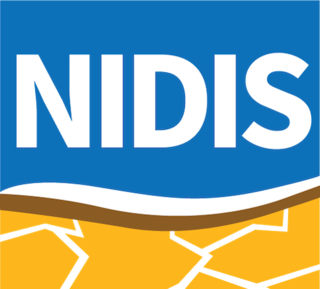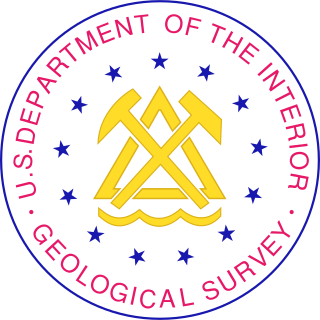The United Nations Convention to Combat Desertification in Those Countries Experiencing Serious Drought and/or Desertification, Particularly in Africa (UNCCD) is a Convention to combat desertification and mitigate the effects of drought through national action programs that incorporate long-term strategies supported by international cooperation and partnership arrangements.

A drought is a period of drier-than-normal conditions. A drought can last for days, months or years. Drought often has large impacts on the ecosystems and agriculture of affected regions, and causes harm to the local economy. Annual dry seasons in the tropics significantly increase the chances of a drought developing, with subsequent increased wildfire risks. Heat waves can significantly worsen drought conditions by increasing evapotranspiration. This dries out forests and other vegetation, and increases the amount of fuel for wildfires.

East Porterville is an unincorporated community in Tulare County, California, United States. Adjacent to the city of Porterville, the community lies by the Sierra Nevada foothills. The population was 7,331 at the 2010 census, up from 6,730 at the 2000 census. For statistical purposes, the United States Census Bureau has defined East Porterville as a census-designated place (CDP). The census definition of the area may not precisely correspond to local understanding of the area with the same name.

Bear Valley Mountain Resort is a ski area in the western United States, located in the Sierra Nevada of California on Highway 4 between Lake Tahoe and Yosemite—about three hours southeast of Sacramento and one hour from Angels Camp. The alpine ski area and a portion of the real estate in the village of Bear Valley was owned by an investment partnership led by a Canadian company, Dundee Realty, from 2005 to 2014, then by Skyline International acquired Bear Valley through October 31, 2023. On November 1, 2023, California Mountain Resort Company, backed by Invision Capital of Chicago, along with ski industry investors Karl Kapuscinski and Tom Cohen announced that they acquired Bear Valley along with properties in the village of Bear Valley. With the acquisition, Bear Valley joins the "Cali Pass" giving pass holders to access 3 other ski resorts in California, as well as resorts at 19 "Powder Alliance Resorts" world wide. The new owners have made many improvements, such as a new bar, refurbished restaurants and plan on completing 4 different lift upgrade projects over the summer of 2024.

An air quality index (AQI) is an indicator developed by government agencies to communicate to the public how polluted the air currently is or how polluted it is forecast to become. As air pollution levels rise, so does the AQI, along with the associated public health risk. Children, the elderly and individuals with respiratory or cardiovascular problems are typically the first groups affected by poor air quality. When the AQI is high, governmental bodies generally encourage people to reduce physical activity outdoors, or even avoid going out altogether. When wildfires result in a high AQI, the use of a mask outdoors and an air purifier indoors are also encouraged.
The United Nations Volunteers (UNV) programme is a United Nations organization that contributes to peace and development through volunteerism worldwide.
The Commission for Environmental Cooperation is an intergovernmental organization established by Canada, Mexico, and the United States to implement the North American Agreement on Environmental Cooperation (NAAEC), the environmental side accord to the North American Free Trade Agreement. The CEC's mission is to facilitate cooperation and public participation to foster conservation, protection and enhancement of the North American environment for the benefit of present and future generations, in the context of increasing economic, trade and social connections among Canada, Mexico and the United States.

The African Peer Review Mechanism (APRM) is a mutually agreed instrument voluntarily acceded to by the member states of the African Union (AU) as a self-monitoring mechanism. It was founded in 2003.

The Middle East Institute (MEI) is a non-profit, non-partisan think tank and cultural centre in Washington, D.C., founded in 1946. It seeks to "increase knowledge of the Middle East among the United States citizens and promote a better understanding between the people of these two areas."
The National Ground Water Association (NGWA), headquartered in Westerville, Ohio, is a membership-based nonprofit organization.

The United States' contiguous western and especially southwestern region has experienced widespread drought since about year 2000. Below normal precipitation leads to drought, and is caused by an above average persistence of high pressure over the affected area. Changes in the track of extratropical cyclones, which can occur during climate cycles such as the El Niño-Southern Oscillation, or ENSO, as well as the North Atlantic Oscillation, Pacific Decadal Oscillation, and Atlantic multidecadal oscillation, modulate which areas are more prone to drought. Increased drought frequency and severity is also expected to be one of the effects of global warming.

The National Integrated Drought Information System (NIDIS) Act was signed into law in 2006 and was reauthorized in 2014 and 2019. The Western Governors' Association described the need for NIDIS in a 2004 report, Creating a Drought Early Warning System for the 21st Century: The National Integrated Drought Information System. The NIDIS Act calls for an interagency, multi-partner approach to drought monitoring, forecasting, and early warning, led by the National Oceanic and Atmospheric Administration (NOAA).

The United States Geological Survey (USGS), founded as the Geological Survey, is an agency of the United States government whose work spans the disciplines of biology, geography, geology, and hydrology. The agency was founded on March 3, 1879, to study the landscape of the United States, its natural resources, and the natural hazards that threaten it. The agency also makes maps of extraterrestrial planets and moons based on data from U.S. space probes.

The United Nations Group of Experts on Geographical Names (UNGEGN) is one of the nine expert groups of the United Nations Economic and Social Council (ECOSOC) and deals with the national and international standardization of geographical names. Every five years it holds the UNGEGN conference. The UNGEGN also publishes international guidelines.
United Nations Security Council resolution 1519 was adopted unanimously on 16 December 2003. After recalling resolutions on the situation in Somalia, particularly resolutions 733 (1992), 1356 (2001), 1407 (2002), 1425 (2002) and 1474 (2003), the council requested the establishment of a monitoring group to investigate violations of the arms embargo against the country.
Soil governance refers to the policies, strategies, and the processes of decision-making employed by nation states and local governments regarding the use of soil. Globally, governance of the soil has been limited to an agricultural perspective due to increased food insecurity from the most populated regions on earth. The Global Soil Partnership, GSP, was initiated by the Food and Agriculture Organization (FAO) and its members with the hope to improve governance of the limited soil resources of the planet in order to guarantee healthy and productive soils for a food-secure world, as well as support other essential ecosystem services.

The National Integrated Drought Information System Reauthorization Act of 2013 is a bill that would reauthorize the National Integrated Drought Information System, a program that examines the impact of droughts and tries to respond to them on a federal level. The bill would extend the program until 2018.

The NITI Aayog serves as the apex public policy think tank of the Government of India, and the nodal agency tasked with catalyzing economic development, and fostering cooperative federalism and moving away from bargaining federalism through the involvement of State Governments of India in the economic policy-making process using a bottom-up approach. Its initiatives include "15-year road map", "7-year vision, strategy, and action plan", AMRUT, Digital India, Atal Innovation Mission, Medical Education Reform, agriculture reforms, Indices Measuring States’ Performance in Health, Education and Water Management, Sub-Group of Chief Ministers on Rationalization of Centrally Sponsored Schemes, Sub-Group of Chief Ministers on Swachh Bharat Abhiyan, Sub-Group of Chief Ministers on Skill Development, Task Forces on Agriculture and up of Poverty, and Transforming India Lecture Series.

Partnership for a Secure America (PSA) is a nonprofit organization in Washington, D.C. that seeks to promote bipartisan solutions to today's critical national security and foreign policy issues. Created by former Congressman Lee H. Hamilton and former Senator Warren Rudman (R-NH) in 2005, the Partnership for a Secure America works with leading Democrats and Republicans to rebuild the bipartisan center in American national security and foreign policy.

The United Nations Committee of Experts on Public Administration (CEPA) is an expert body that meets under the auspices of the United Nations Economic and Social Council in order to discuss and find ways to support the work of the Council by providing expert advice on matters concerning governance and public administration structures.













